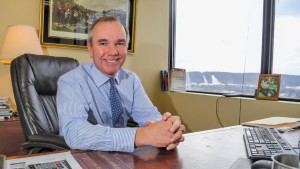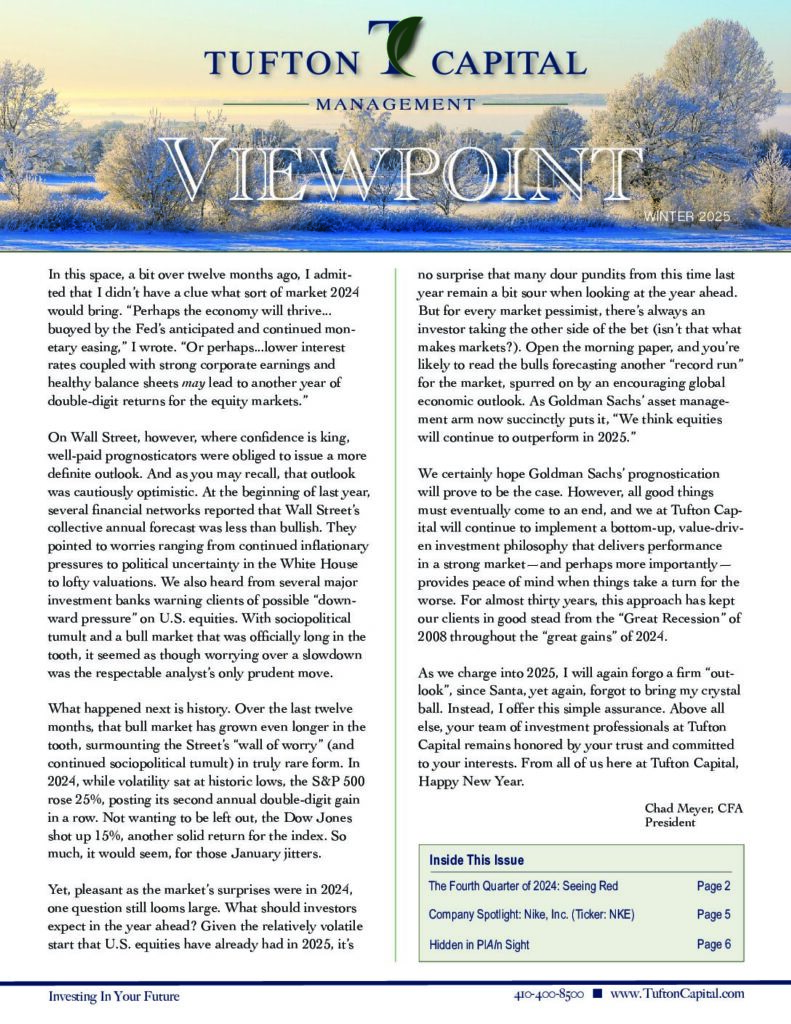From the Baltimore Business Journal:
Randy McMenamin went into work on Oct. 19, 1987, ready to buy stocks. By the end of the day, he was telling himself, “Holy you know what.”
Thirty years later, Black Monday still remains the biggest single-day stock market collapse in history, partially the result of computer programs automatically selling index futures amid a drop in the markets. The Dow Jones Industrial Average fell more than 500 points, or 23 percent. McMenamin was working on the investment side of Baltimore’s Mercantile-Safe Deposit & Trust Co. at the time. Now a managing director at Hunt Valley-based Tufton Capital Management, McMenamin and other local money managers say they have not forgotten about the infamous day, and they think a big collapse will inevitably occur again one day.
The Friday before Black Monday, the stock market fell 200 points, setting the stage for what was to come. At the time though, McMenamin said he had his team ready to buy stocks on Monday. He had his team compile a list of the 10 or 15 stocks to give to the trader. Later that day, McMenamin asked the head equity trader how things were going, and found out the computer system was clogged because of the selloff. McMenamin canceled the trades.
“I was scared,” McMenamin said. “I was frightened. I came home and my wife and daughters met me outside and were clapping cheering, ‘Daddy’s home.'”
When he turned on the television, he thought the world was coming to an end. The next day, McMenamin said a mentor called him to ask how he was doing. The mentor asked if anyone had died. When McMenamin said no one had died, he realized that the crisis at the time was not permanent and the market would eventually recover.
“We didn’t know when, but you have to be patient,” McMenamin said. “We decided don’t sell. We may not buy anything, but don’t sell. Quality always recovers. It was scary, but we reached back and said quality always prevails.”
The stock market didn’t recover overnight, but McMenamin said he “started nibbling” by buying stocks on a selective basis.
David Berman, co-founder and CEO of Timonium firm Berman McAleer, had just begun his career in 1988, in the aftermath of the crash. He said he was scrambling to attract clients at a time when people wanted little to do with the stock market.
“It colored every prospecting call for a couple of years,” Berman said.
When the latest recession happened, McMenamin and Berman both used their experience to weather the storm. McMenamin recalled buying General Electric Co. at $9.50 per share and Harley-Davidson Inc. for $10 per share. Now, General Electric (NYSE: GE) trades around $23 and Harley-Davidson (NYSE: HOG) trades around $48.
For Berman, he said saw how those who didn’t panic in 1987 turned out. So when the Great Recession happened, his firm did not sell off anything. Instead, the firm used the recession as an opportunity to “rebalance” its funds by buying certain stocks in different asset classes.
“We were fully invested in the recovery from the recession,” Berman said. “We took the full brunt of the pain but got the full experience of the recovery.”
While McMenamin learned from his experience, he said he thinks another big stock market fall will happen again for several reasons. For one, he said there are new people coming into the business who do not have a lot of experience and have not been through a panic. He also said crashes are somewhat cyclical, with the “nasty ones” occurring about every 15 years.
Niall O’Malley, the founder and managing director of Blue Point Investment Management LLC in Towson, was still in college at the time of Black Monday. He recalled being involved in a stock club and “just seeing these huge numbers.” Like McMenamin, he thinks there will be another crash one day because “human nature has a repeatable pattern.”
The current market, in the midst of an 8-year run, has a lot of “valuation risk,” O’Malley said.
Trading has become “crowded” and the market has become inflated, O’Malley said, because everyone is investing in Apple, Facebook, Amazon, Netflix and Google. More money has also been invested in passive strategies, like exchange-traded funds and passive index funds, which are weighted toward the same big technology companies.
If something were to happen to any of the companies, O’Malley said, it could create a crash. He also that a change in leadership at the Federal Reserve could also have a massive impact on the markets.
“The Federal Reserve has played a role in the financial market valuation more than any other factor,” O’Malley said.
To protect against a potential future crash, McMenamin said his funds are balanced between common stocks and bonds, since they tend to trade at the inverse of each other. O’Malley said he has decreased his holding in Amazon from 10 percent down to 3 percent. He also uses cash as an asset class and maintains a 14 percent cash level, higher than the typical 5 percent of most mutual funds.
Like McMenamin and O’Malley, Berman said he fully expects to see another crash.
“It’s highly likely it will happen again, and happen multiple times again during my career,” Berman said.
When a crash does happen, investors should not sell off because then they will lose out in the long run during the recovery.
The equity market is still the best way to create wealth, Berman added, and people should not be scared of investing just because there could be another Black Monday.
“You don’t not get into a car because you never want to get into a traffic jam or an accident,” Berman said.
The Baltimore Business Journal featured Tufton, and explained our vision of rebranding the company for a new era. Click here to read the article.
The Baltimore Sun featured Tufton, and briefly explaining our vision for the rebrand. Click here to read the article.
Effective February 23, Hardesty will being operating as Tufton Capital Management, LLC
Hunt Valley-based Hardesty Capital Management has rebranded and officially changed their company name to Tufton Capital Management effective immediately. The independently owned investment advisory firm is one of the largest in the region with nearly $1 billion dollars in assets for individual clients and institutions.
The firm previously known as Hardesty was founded in Baltimore, Maryland in 1995 by Jim Hardesty and Randy McMenamin. The namesake of the company, Jim Hardesty, retired from the firm in April of 2015 and passed away the following month. In explaining the name change, Chad Meyer, President of the firm remarked “The Hardesty name will always connote trust, financial acumen and a deep devotion to our clients. We feel strongly, however, that the contributions of all of our employees, and not just those of our co-founder, be reflected in our corporate name. While Jim Hardesty’s legacy and invaluable contribution to our organization will live on, we believe that a new name will best represent our entire firm as we move forward.”
The Tufton Capital Management name was selected after a thorough evaluative review and was ultimately voted on unanimously by the entire firm. The offices of Tufton Capital, a 13 person firm, overlook the beautiful Tufton Valley of northern Baltimore County. The company will celebrate their 21st anniversary this year.
Tufton Capital Management is an independently owned wealth management and investment advisory firm located in Hunt Valley, Maryland with nearly $1 billion in assets for individual clients and institutions. The 13-person firm, founded in 1995, provides a value-oriented investment approach to high net worth individuals, families and institutions.
For more information, please contact Dana Metzger Cohen or Karen Evander at Clapp Communications at 410-561-8886 or dana@clappcommunications.com or evander@clappcommunications.com.
Hunt Valley, MD – Hardesty Capital Management announced the retirement of company cofounder James D. Hardesty, CFA, effective April 15, 2015. Hardesty’s decision to retire will end an extraordinary 45-year career in the investment management industry.
Mr. Hardesty served as Chairman of the Board, Market Strategist and Chief Economist. He cofounded Hardesty Capital in 1995 with V. Randolph McMenamin, CFA, Managing Director and Vice President of Hardesty Capital Management. After retiring, Mr. Hardesty now serves as Chairman Emeritus of Hardesty Capital, and he continues to serve in a consulting role mentoring young staff members.
Mr. Hardesty held numerous leadership positions in the industry prior to Hardesty Capital, including Chief Investment Officer and Executive Vice President at Mercantile Safe Deposit and Trust Company. Under his leadership at Hardesty Capital, assets under management have grown to just under one billion dollars.
In addition to his business activities, Jim sits on a number of industry and non-profit boards. He currently serves as Vice Chairman of the Board for the Harford Mutual Insurance Company. Previously, he was Trustee of LINC (Learning Independence Through Computers) as well as the Board of Family & Children’s Services of (more…)
A local investment-management firm quite literally followed the money and moved from Baltimore City to Hunt Valley.
By Rick Seltzer, The Baltimore Business Journal Sep 16, 2014, 7:27am EDT
Investment firm’s offices had been in Mount Vernon since its founding in 1995
By Natalie Sherman, The Baltimore Sun 6:59 p.m. EDT, September 15, 2014
Stay the course. That’s what Baltimore-area money managers are telling their clients in the wake of the stock market’s 5 percent slide this year.
By Gary Haber, The Baltimore Business Journal Feb 6, 2014, 2:47pm EST
 As we begin the New Year, Maryland investors find themselves in a bit of a quandary: where to invest in 2014. There do not appear to be any clear options. The consensus view on Wall Street is that interest rates will move higher. If correct, that would mean their more safe investments, bonds, are headed for another difficult year. Stocks are up significantly since the financial crisis and appear fully valued. Perhaps the year will not be kind to stocks either. Cash is yielding nothing and unless the Fed has a drastic change of heart, that is not expected to change. So, what’s an investor to do in this environment?
As we begin the New Year, Maryland investors find themselves in a bit of a quandary: where to invest in 2014. There do not appear to be any clear options. The consensus view on Wall Street is that interest rates will move higher. If correct, that would mean their more safe investments, bonds, are headed for another difficult year. Stocks are up significantly since the financial crisis and appear fully valued. Perhaps the year will not be kind to stocks either. Cash is yielding nothing and unless the Fed has a drastic change of heart, that is not expected to change. So, what’s an investor to do in this environment?
The bond market is probably not the answer as we are most likely headed for another difficult year. The Quantitative Easing program should end in 2014 and the Fed may begin to seriously contemplate increasing the Fed Funds rate. The mere threat of tapering the QE program in 2013 caused a violent reaction as the yield on the 10-year Treasury spiked from 2% in June to 3% in September. The 10-year Treasury began 2013 yielding 1.76%. An upward bias to yields of most maturities longer than 2 years persisted throughout 2013 and many pundits suggest 2014 will likely be no different. Investors are not used to losing money in their bond investments. (more…)
Money management companies report growth in 2013
By Natalie Sherman, The Baltimore Sun 10:16 a.m. EST, January 4, 2014
If you want to know something about the history of the Baltimore investment community, you might want to call James Hardesty.
The 67-year-old history buff and chairman of Hardesty Capital Management has spent his career in Baltimore, starting with a job in the mail room of Alex. Brown & Sons and later as an executive at the old Mercantile Safe Deposit & Trust Co. Both Baltimore companies eventually were acquired.
He founded his own investment firm in Baltimore in 1995. Today, it manages $800 million in assets, with a goal of reaching $1 billion within two years. To help achieve that, the firm recently hired a new president.
Hardesty recently discussed the stock market, challenges for his firm and an old classmate who is a former U.S. president.
After buying a Timonium court reporting company and a Towson spice maker, Chad Meyer is returning to his business roots — the world of high finance.
By Gary Haber, The Baltimore Business Journal Dec 3, 2013, 2:19pm EST
 Several times a month I am asked where I think the stock market will be in six months or a year. The question implies that I am some sort of stock market astrologer, and that would be very scary. I just reply “I have no idea.” In the short term, I doubt that anybody has much of an idea where the stock market will go. But over the last 75 years, the market has provided an average total return of 9.4% compounded annually, comprised of 5.4% price appreciation and 4.0% dividend yield.
Several times a month I am asked where I think the stock market will be in six months or a year. The question implies that I am some sort of stock market astrologer, and that would be very scary. I just reply “I have no idea.” In the short term, I doubt that anybody has much of an idea where the stock market will go. But over the last 75 years, the market has provided an average total return of 9.4% compounded annually, comprised of 5.4% price appreciation and 4.0% dividend yield.
But the market direction question is really trying to ask is how do you time the market: when do you sell out and when do you buy in? This strategy of market timing is fraught with risk and can be very dangerous. The timing of the market requires two critical decisions: when to get out and, more importantly, when to get back in. The second decision, when to reenter the market, is really the hard part. (more…)
 For the first time in my life, I am being asked when I plan to retire. It seems like only yesterday, when as a ten or twelve year old, I would sit in church on Sunday mornings thinking I would never finish my education, let alone turn sixty-five, then considered a normal retirement age. Now I am sixty-seven and advising clients on retirement planning.
For the first time in my life, I am being asked when I plan to retire. It seems like only yesterday, when as a ten or twelve year old, I would sit in church on Sunday mornings thinking I would never finish my education, let alone turn sixty-five, then considered a normal retirement age. Now I am sixty-seven and advising clients on retirement planning.
Sooner or later, almost every retired client of our firm; a young sixty something or the very old; the moderately wealthy or the very rich; the big livers or thrifty old ladies, all ask the same question: “Will I run out of money in my lifetime?” I have come to the conclusion that no matter how wealthy you are, you will know you are old when you think you might run out of money. (more…)
‘Uncertainty fatigue’ has set in among investors
By Eileen Ambrose, The Baltimore Sun October 13, 2013






